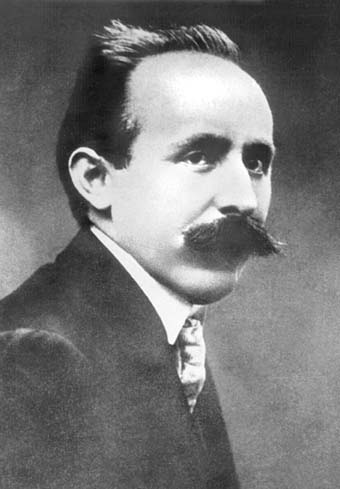Petar Kočić
 Petar Kočić (; 29 June 1877 – 27 August 1916) was a Bosnian Serb writer, activist and politician. Born in rural northwestern Bosnia in the final days of Ottoman rule, Kočić began writing around the turn of the twentieth century, first poetry and then prose. While a university student, he became politically active and began agitating for agrarian reforms within Bosnia and Herzegovina, which had been occupied by Austria-Hungary following the Ottomans' withdrawal in 1878. Other reforms that Kočić demanded were freedom of the press and freedom of assembly, which were denied under Austria-Hungary.
Petar Kočić (; 29 June 1877 – 27 August 1916) was a Bosnian Serb writer, activist and politician. Born in rural northwestern Bosnia in the final days of Ottoman rule, Kočić began writing around the turn of the twentieth century, first poetry and then prose. While a university student, he became politically active and began agitating for agrarian reforms within Bosnia and Herzegovina, which had been occupied by Austria-Hungary following the Ottomans' withdrawal in 1878. Other reforms that Kočić demanded were freedom of the press and freedom of assembly, which were denied under Austria-Hungary.In 1902, Kočić published his first short story collection. He published two more short story collections in 1904 and 1905, and subsequently adapted one of his most successful short stories, ''The Badger on Trial'', for the stage. Kočić subsequently led several demonstrations in Sarajevo and was imprisoned on three occasions for publishing newspaper tracts critical of Habsburg rule. He spent the majority of his imprisonment in solitary confinement, which contributed to his development of depression. In 1909, Kočić was released as part of a general amnesty. The following year, he published his third and final short story collection, and won a seat in the newly created Diet of Bosnia (''Sabor''), where he became the leader of a faction of anti-Austrian Serb nationalists. He lobbied for increased concessions to Bosnian Serb peasants and farmers, agitating against the Austro-Hungarians as well as the Bosnian Muslim landowning class. He left the ''Sabor'' in 1913, citing mental exhaustion. In January 1914, Kočić was admitted into a Belgrade mental hospital, where he died two years later.
Kočić was one of the most important Bosnian Serb politicians of the Austro-Hungarian era, as well as one of Bosnia and Herzegovina's most important twentieth-century playwrights. He was noted for his fiery temperament and sharp wit, which he frequently deployed against the Austro-Hungarian authorities. Kočić's works not only influenced an entire generation of Bosnian intellectuals, such as the future Nobel laureate Ivo Andrić, but also the Serbian and Yugoslav nationalist movements, as well as the Bosnian autonomist and Yugoslav communist movements. Numerous streets in Bosnia-Herzegovina and Serbia carry his name and his likeness has appeared on Bosnian 100 KM banknotes since 1998. Provided by Wikipedia
-
1